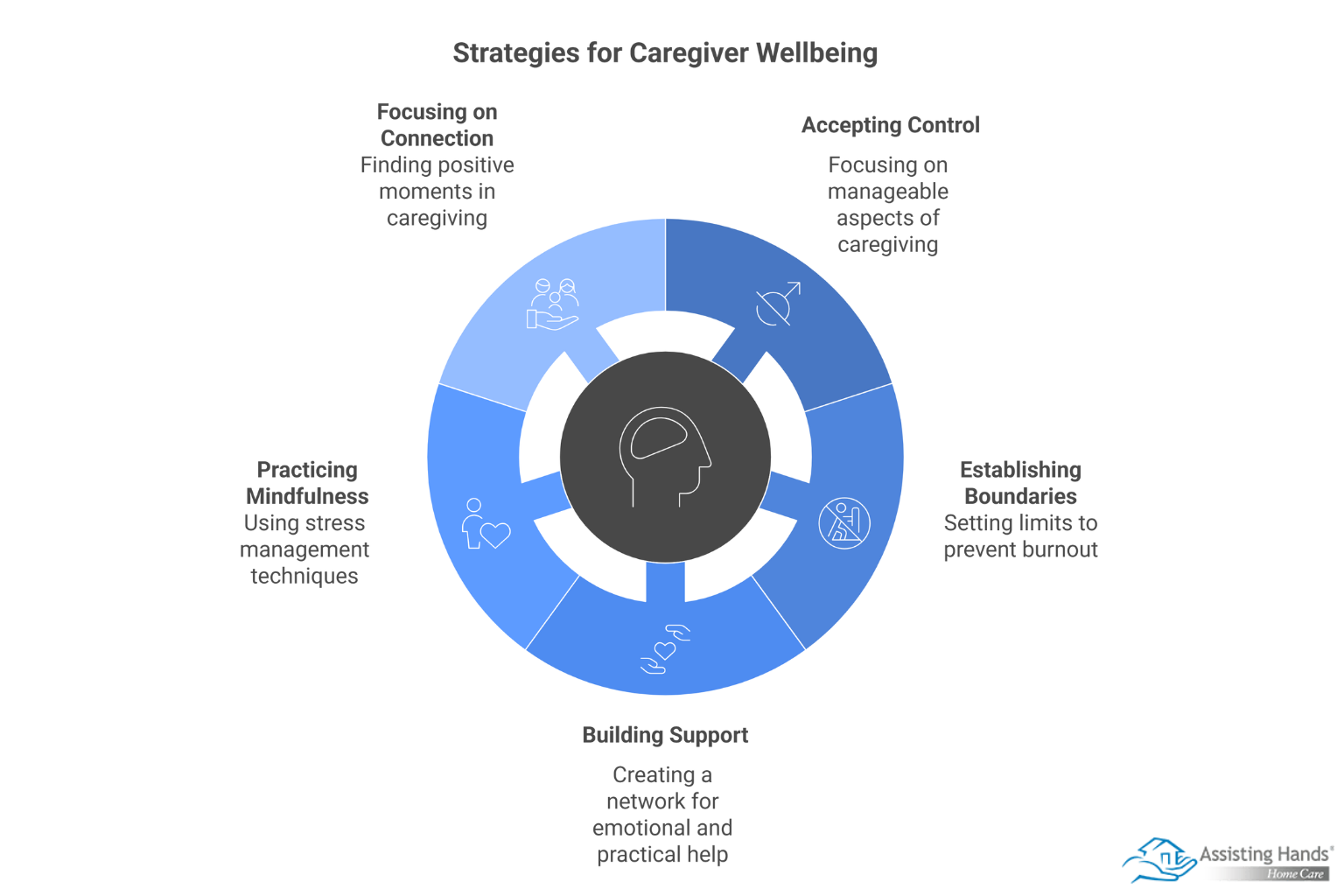
Table of Content
Caring for a challenging aging family member can test your emotional limits and strain relationships. The journey becomes even more complex when dealing with conditions like dementia, where behavioral changes and cognitive decline add layers of difficulty to already demanding caregiving responsibilities.
Accept What You Cannot Control
One of the most liberating realizations in caregiving comes from distinguishing between what you can and cannot influence. Your loved one’s diagnosis, personality changes, or resistance to help often lie beyond your direct control. However, your response to these challenges remains entirely within your power.
Focus your energy on manageable aspects of caregiving:
- Your own self-care routines and boundaries
- The quality of professional support you arrange
- Creating a safe, comfortable environment
- Maintaining your own emotional and physical health
- Seeking appropriate medical care and interventions
When you find yourself frustrated by your loved one’s behavior or the progression of his or her health condition, pause and redirect your attention toward actionable steps. This shift in perspective reduces feelings of helplessness and channels your energy into productive caregiving activities.
Seniors can face a variety of age-related challenges. Though some families choose to take on the caregiving duties, there may come a time when they need a trusted home care provider. Families sometimes need respite from their duties so they can focus on their other responsibilities, and some seniors need around-the-clock assistance that their families are not able to provide. Assisting Hands Home Care is here to help.

Establish Clear Boundaries and Expectations
Setting healthy boundaries protects both you and your loved one from the harmful effects of caregiver burnout. Boundaries aren’t selfish—they’re essential for sustainable long-term care that preserves your relationship and wellbeing.
Define your limits clearly:
- Specify which caregiving tasks you can realistically handle.
- Identify behaviors you won’t tolerate, such as verbal abuse or manipulation.
- Set specific times when you’re available for caregiving duties.
- Determine which responsibilities require professional assistance.
- Communicate your boundaries clearly to other family members.
Remember that boundaries may need adjustment as care needs evolve. A loved one with progressing dementia may require different boundary considerations than someone with stable but challenging personality traits. Regular reassessment ensures your boundaries remain appropriate and protective.
One of the most challenging tasks of helping an elderly relative age in place safely and comfortably is researching agencies that provide senior home care. Columbus families can turn to Assisting Hands Home Care for reliable, high-quality in-home care for aging adults. We offer 24-hour care for seniors who require extensive assistance, and we also offer respite care for family caregivers who need a break from their caregiving duties.
Build a Strong Support Network
Isolation intensifies the stress of caring for a difficult loved one. Building connections with others who understand your challenges provides emotional relief and practical guidance that makes caregiving more manageable.
Develop multiple sources of support:
- Join local or online caregiver support groups specific to your loved one’s condition.
- Connect with friends and family members who can provide respite care.
- Establish relationships with healthcare professionals who understand family dynamics.
- Consider professional counseling to process complex emotions.
- Engage with community resources like senior centers or religious organizations.
Don’t wait until you’re overwhelmed to reach out for help. Proactive relationship-building creates a foundation of support you can rely on during particularly challenging periods. Many caregivers find that sharing experiences with others in similar situations reduces feelings of guilt and isolation.
Practice Mindfulness and Stress Management
Chronic stress from difficult caregiving situations can impact your physical health, emotional stability, and decision-making abilities. Developing consistent stress management practices helps you maintain perspective and respond thoughtfully rather than reactively to challenging behaviors.
Incorporate daily stress-relief practices:
- Deep breathing exercises during moments of high tension
- Short meditation sessions to center yourself before caregiving interactions
- Physical activity that releases built-up stress and tension
- Journaling to process complex emotions and track patterns
- Regular breaks from caregiving responsibilities, even if brief
Mindfulness techniques help you stay present during difficult interactions rather than becoming overwhelmed by past frustrations or future worries. When your loved one exhibits challenging behavior, mindful breathing can help you respond with patience rather than anger or desperation.
Focus on Moments of Connection
Even the most difficult relationships contain opportunities for meaningful connection. Shifting your attention toward positive interactions, however small, can transform your caregiving experience and strengthen your emotional resilience.
Look for connection opportunities:
- Shared activities that bring your loved one joy or comfort
- Stories from your loved one’s past that reveal his or her personality before illness
- Small gestures of appreciation or affection your loved one still expresses
- Moments when your loved one seems more like his or her former self
- Ways care allows you to express love despite the challenges
These positive moments don’t erase the difficulties, but they provide emotional sustenance that helps you continue caregiving with compassion. Some caregivers find it helpful to keep a daily record of positive interactions, creating a resource they can review during particularly challenging days.
Family caregivers need to care for their own wellbeing. If you’re caring for an aging loved one and are feeling overwhelmed, consider hiring a professional caregiver to provide respite care. Columbus families who want to prevent burnout can turn to Assisting Hands Home Care. One of our professional caregivers can assist your loved one at home while you take a nap, go to work, run errands, or go on vacation. Assisting Hands Home Care can be your trusted partner when your loved one needs help with the challenges of aging. Call us today to learn about our high-quality in-home care services.








